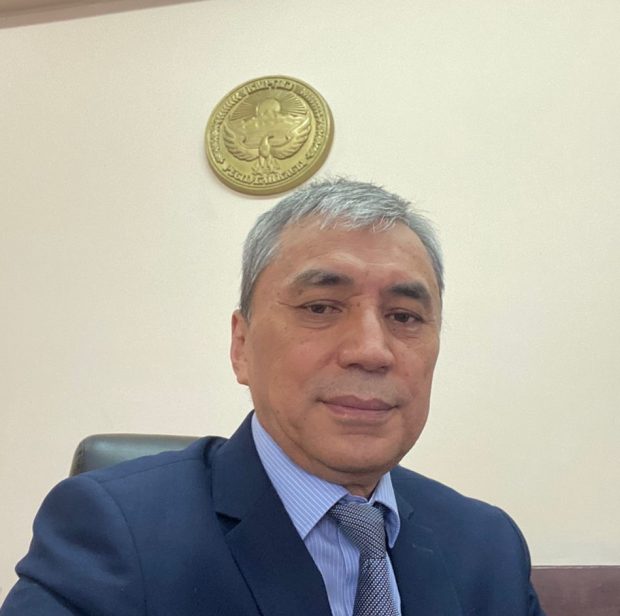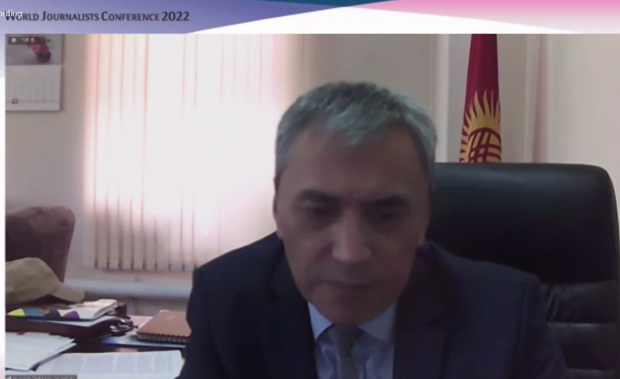Emergence, elimination of the fake information space

Kuban Taabaldiev
Text of the speech delivered by Kuban Taabaldiev, Director General of Kabar News Agency, Kyrgyzstan, at the World Journalists Conference (WJC 2022)
BISHKEK: We are witnessing the rapid increase of the influence the media flow has on big politics. Recent events fully prove such conclusions. Until now, the common perception was that political players use media to their own advantage, specifically aiming the flow of information in the direction they need.
In other words, politics was primary and information resources followed in a given direction. This system was stable in giving certain results in favor of any given policies.
However, over time as people stepped into the so-called “Internet era” it became obvious that information flows had the ability to rise above politics. More stories began to be fabricated, with their authors spreading their versions of events that were beneficial to them.
This was the era of Web 1.0, associated with the growth of the Internet’s influence on all aspects of life within the global community. This went on for a dozen years, during which information technology progressed so far that social networks emerged. There is no limit to the growth of these diverse platforms.
We all remember well when Facebook appeared and initiated the creation of a new information society. At first, not everyone understood the significance of this network, but gradually began to appreciate it, until Facebook became one of the most important social and informational platforms. Its members could receive and distribute a wide array of news and stories, as well as opinions and interpretations.
The information flow on the platform has increased significantly when the function of forming groups was introduced to the platform, which made it possible to multiply the audience of a single source. This led to the creation of countless groups united by different interests – social, economic and of course political.
There are cases when Facebook groups have been used very effectively in election processes in certain countries at different levels. In particular, the example of Kyrgyzstan during the political events of 2020, when there was a change of power largely organized by Facebook pages, proves this well.
Soon similar platforms with various additional features began to appear and work in parallel with Facebook – Twitter, Instagram, Telegram, YouTube for video information. China also launched many of its own platforms on the web.
The most effective new form of sharing information right now is TikTok, a platform which is used by a large number of young people who themselves become the authors of various information flows. The new possibilities of IT-technologies will surely continue to create more new forms and solutions to distribute information to a very wide range of people.
In these circumstances, it becomes almost impossible to track the authenticity of information, which has lead to a lot of fake news. These stories can be divided into two types. The first type consists of unintentional fake stories, when their authors spread them without realizing their unreliability.
Therefore, the issue of media literacy among the young audience on the web is now becoming very urgent. It is more important than ever to educate them to distinguish truth from lies.
The second type consists of purposefully created and deliberately distributed fake information. The effect of such materials on public consciousness around the world is becoming stronger every day.
The main reason for the spread of fake news is the unlimited growth of platforms on Web 2.0. Social networks are largely unregulated, except for their owners’ ability to manage platform participants to some extent. However, even they are already becoming dependent on big politics. Recent events in the world prove this quite clearly.

In general, we can conclude that the time of relevance of traditional media among the public, and through them within big politics, is unfortunately a thing of the past. Such traditional media outlets are themselves increasingly moving to social networks, thus also becoming active participants in the new trend of unrestrained spread of information. Moreover, journalists are losing their credibility among the audience because their information is not popular, although accurate. The audience wants sensationalism and scandals.
This negatively affects the credibility of the media, and increases the popularity of social networks.
The world community needs to encourage and educate people, especially the younger generation, about the traditional values of media. It could be very difficult, but it must be done. Otherwise, we will find ourselves in a world with a completely unreliable, fake information space. An educated society needs to be able to figure out where the truth is and where is the lie.





















































